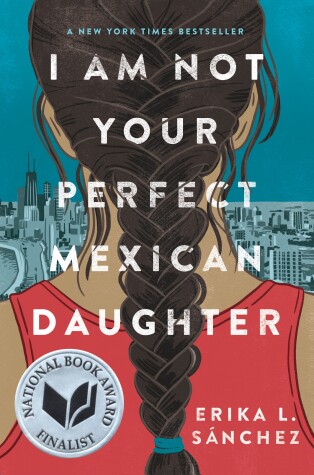Reviewed by girlinthepages on
I will be 100% honest and say that this book was not what I was expecting. With the Jane the Virgin reference in the synopsis and the "laugh out loud" funny claim, I was expecting something heavy but with moments of levity and a strong thread of self aware humor throughout, much like the 2018 release American Panda, which also focuses on a protagonist who is a child of immigrants navigating two cultures. However, I found I Am Not Your Perfect Mexican Daughter to actually be quite heavy, and at times hard to read, though it definitely tells an important story.
The novel follows protagonist Julia, the child of Mexican immigrants in Chicago, as she navigates her final two years of high school. From the onset of the novel, it's apparent that Julia is deeply unhappy for various reasons, often blaming her Mexican heritage, though magnified by the recent death of her sister. I originally thought that the book was going to be a sort of contemporary-mystery focusing on Julia discovering the truth about her dead sister and the secrets she was keeping. While the first 25% or so of the novel focuses on Julia's obsession with her sister's secrets, it takes a sharp turn and starts to focus more inwardly on Julia and her own emotional and mental struggles, as she falls deeper and deeper into despair and suffocates under the expectations of her parents and balancing her desires for her future against her family's.
The atmosphere Sánchez creates in her novel is truly authentic, with the perfect mix of Mexican and English culture and language (I myself was on the receiving end of some "malcriadas" and "ave maria purisimas" in my youth, and I can state with confidence that the terminology used was exactly what a disapproving Latina mother/grandmother would use). The depressing, dingy Chicago neighborhood where Julia lives is juxtaposed with the bright and vibrant Mexican culture, and Julia actually spends a period of time in Mexico during the book, which may initially seem like a punishment but is actually very restorative for her and helps give the reader more insight into the two worlds Julie is straddling- one where she is the rebellious, intelligent, frustrating yet loved Americanized daughter, and one where she is the diverse, poor outcast fighting for her place in an often white-washed world- too Mexican among Americans and too American among her Mexican family (as evidenced when Julie comments that she's considered too skinny in Mexico and too fat in America).
Though the novel portrays a lot of the hardships of the immigrant and child of immigrant experience in the US and tackles many important and tough topics, I had several issues with it that made the reading experience somewhat difficult at times. The narrative would often have very abrupt time jumps that skipped months/seasons ahead, that left me feeling like I had literary whiplash and some MAJOR events were glossed over, including a suicide attempt. Now, I'm not one to say everything needs a trigger warning, but it was just so sudden and abrupt and I feel like it warranted more attention than it received. However the aftermath was discussed a lot including a lot of positive focus on the recovery process. There's also the fact that this book is less than 400 pages and covers about two years of time, which is quite a bit for a contemporary novel. The story also delves pretty deep into depression, and Julia's first person narrative can often be difficult to read as she's frustrating, confrontational, dissatisfied with everything, and so, so angry all of the time. While her experience is important to the story, I did find it could be exhausting to be inside her head and I did occasionally have to take some breaks because of that (although I did read this book in 48 hours so I was still pretty invested despite all that).
Overall: I Am Not Your Perfect Mexican Daughter is an important and stunning narrative in many ways, shining an honest and candid light on the immigrant and first generation experience and not shying away from difficult to discuss topics, especially identity, mental health, and culture. However, there were jarring time jumps in the narrative and Julia's narrative voice while important, was hard for me to read at times. I'd highly recommend this book to anyone who wants to read more diversely, especially regarding the Latinx community, even if it may be a harder read to get through. This review was originally posted on Girl in the Pages
Reading updates
- Started reading
- 23 November, 2017: Finished reading
- 23 November, 2017: Reviewed
